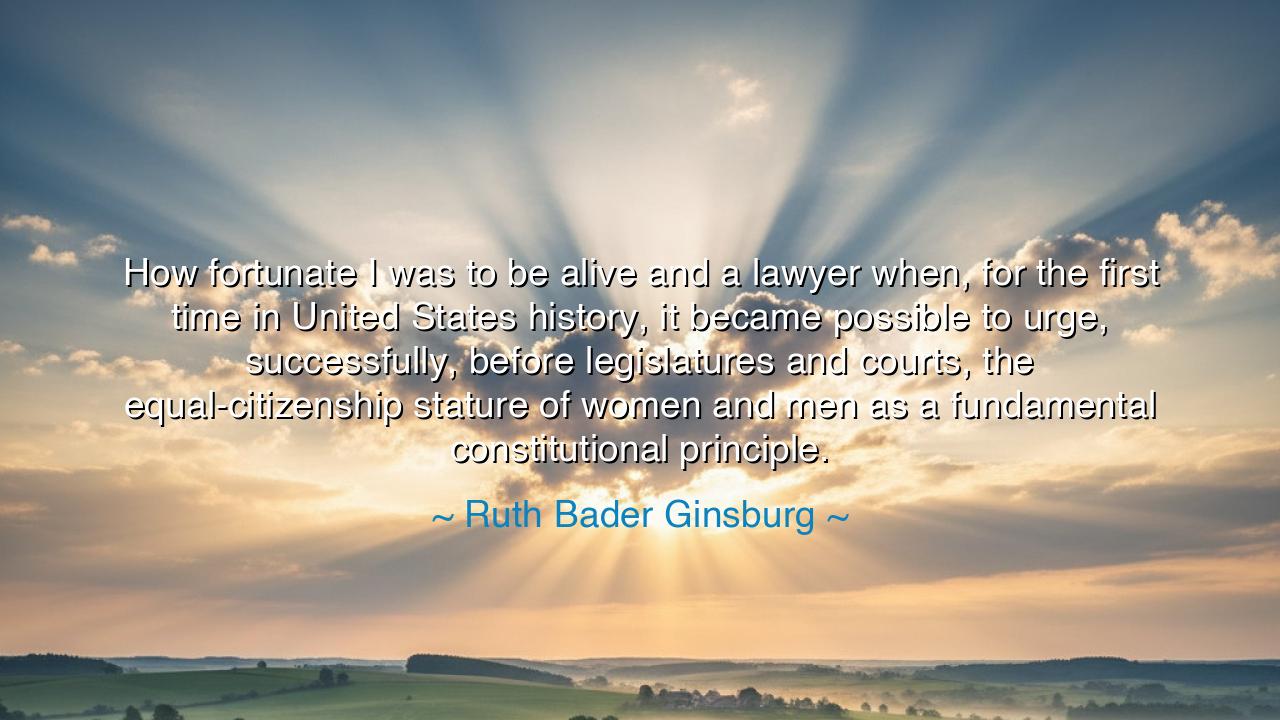
How fortunate I was to be alive and a lawyer when, for the first
How fortunate I was to be alive and a lawyer when, for the first time in United States history, it became possible to urge, successfully, before legislatures and courts, the equal-citizenship stature of women and men as a fundamental constitutional principle.






In a voice as calm as justice and as enduring as time, Ruth Bader Ginsburg once said: “How fortunate I was to be alive and a lawyer when, for the first time in United States history, it became possible to urge, successfully, before legislatures and courts, the equal-citizenship stature of women and men as a fundamental constitutional principle.” These words, spoken from the heart of history itself, are more than reflection—they are gratitude mingled with triumph, humility joined with greatness. In them lives the echo of centuries of struggle, the quiet strength of a woman who carried the torch of equality through the shadowed halls of law and tradition. Her words are not boast, but benediction—a recognition that destiny had placed her at the turning of an age, when the long-denied truth of equality was finally given voice in the language of justice.
To understand the origin of this quote, one must journey to the crucible of Ginsburg’s life and the era that forged her. Born in 1933, she entered a world where law was a fortress built by men, for men. Women were allowed inside, but rarely welcomed. When she graduated at the top of her class from Columbia Law School, no firm would hire her—not because she lacked brilliance, but because she was a woman, and worse yet, a mother. Yet from these rejections, she drew not bitterness, but resolve. As the fires of the civil rights movement spread through America in the 1960s and 1970s, Ginsburg discerned another silent revolution waiting to be fought: the recognition of women as full citizens under the Constitution. Her words about being “fortunate” refer to this moment—the dawning of a new era when the winds of justice began to stir and when, for the first time, the courts were willing to listen.
It was in those years that Ruth Bader Ginsburg, as a lawyer for the American Civil Liberties Union, crafted her legacy case by case, argument by argument, with the precision of a sculptor revealing form from marble. She did not rage against the system; she reasoned with it. She appealed not to emotion, but to principle. Her cases—such as Reed v. Reed in 1971—became milestones, gently but firmly embedding gender equality into the framework of American law. She persuaded the justices of the Supreme Court that discrimination against women was not simply unfair, but unconstitutional—a violation of the nation’s founding promise that “all are created equal.” When she later spoke of being “fortunate,” she was acknowledging that rare confluence of courage, timing, and truth that allows an idea long confined to hope to step forth into history.
The ancients would have called Ginsburg’s fortune kairos, the moment when destiny meets readiness. Like the philosophers of old, she knew that justice moves slowly, not because it is weak, but because it must be rooted deeply to endure. Her recognition of “fortune” was not luck—it was reverence for time’s unfolding. She was born when the soil was ready to receive the seed of equality, and she chose to be the one who would plant it. Her voice was quiet, but her conviction was unyielding, for she understood that law, though written by humans, could reflect something divine—the moral order that declares all souls equal before creation.
There is, too, in her words, a lesson of humility. Many would claim victory as their own, but Ginsburg saw herself as part of a greater story. She spoke not of personal triumph but of collective progress—of all the women and men who had struggled before her and alongside her, from suffragists who fought for the vote to working women who demanded fair wages. Her gratitude was for the moment itself—for the privilege of standing in history’s courtroom when justice at last began to listen. In her acknowledgment, one hears the echo of those ancient teachers who knew that greatness is not measured by what one accomplishes, but by the cause one serves.
Her life reminds us that every age holds its own frontier of justice. Just as Ruth Ginsburg stood before the law to argue for equal citizenship, so too must each generation stand for the rights that remain unrealized. The lesson she leaves us is both simple and profound: that progress is not gifted from above—it is carved from resistance, built through patience, and sustained by faith in the dignity of every person. Her belief that equality could be proven, not only preached, turned an abstract ideal into a living reality.
So, O listener, take these words of hers as sacred counsel: be grateful for the time you are given, but do not be passive within it. Seek the cause that your moment in history calls you to serve. Use your gifts, your intellect, your compassion—whatever tools are yours—to build upon the foundation laid by those before you. As Ruth Bader Ginsburg reminds us, fortune is not merely being present at a great turning—it is choosing to participate in it. And when the work of your own era is done, may you too look back and say, with humility and pride, “How fortunate I was to be alive when justice called my name—and I answered.”






AAdministratorAdministrator
Welcome, honored guests. Please leave a comment, we will respond soon